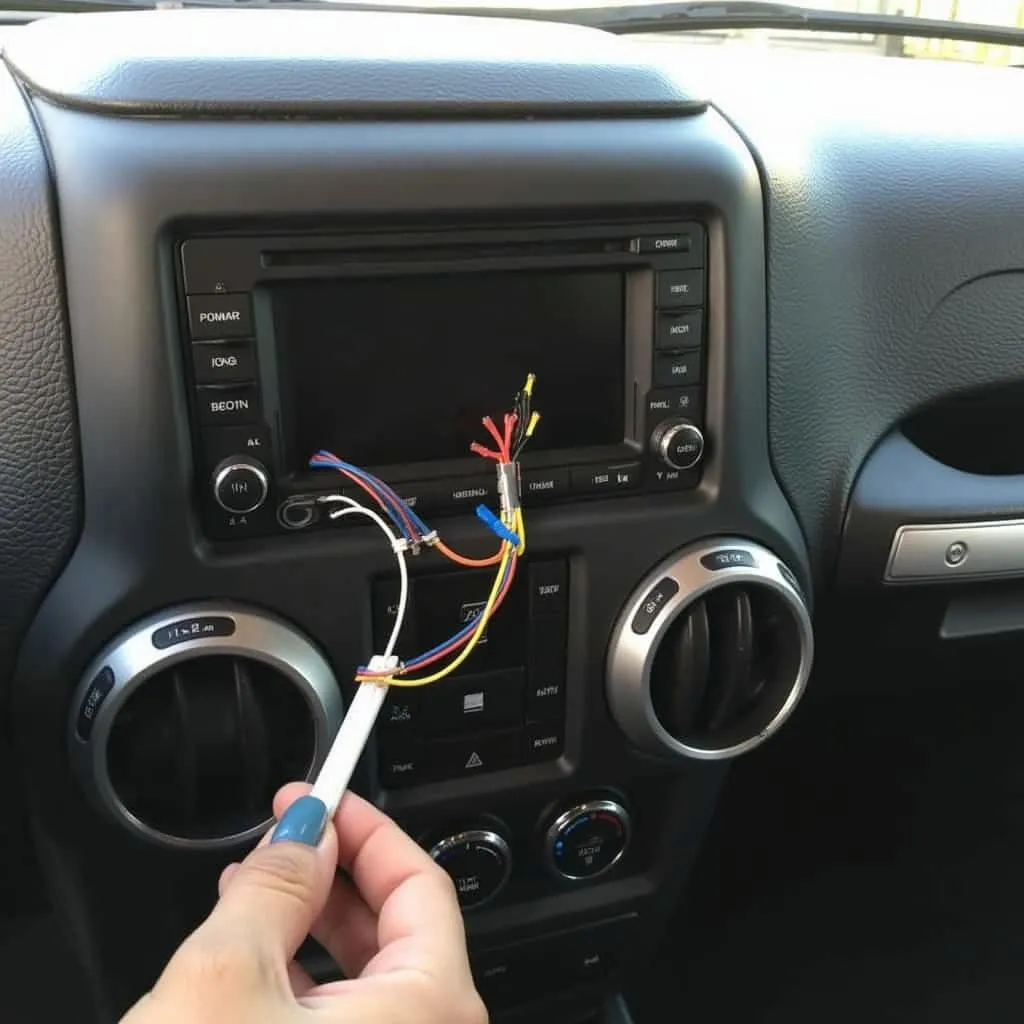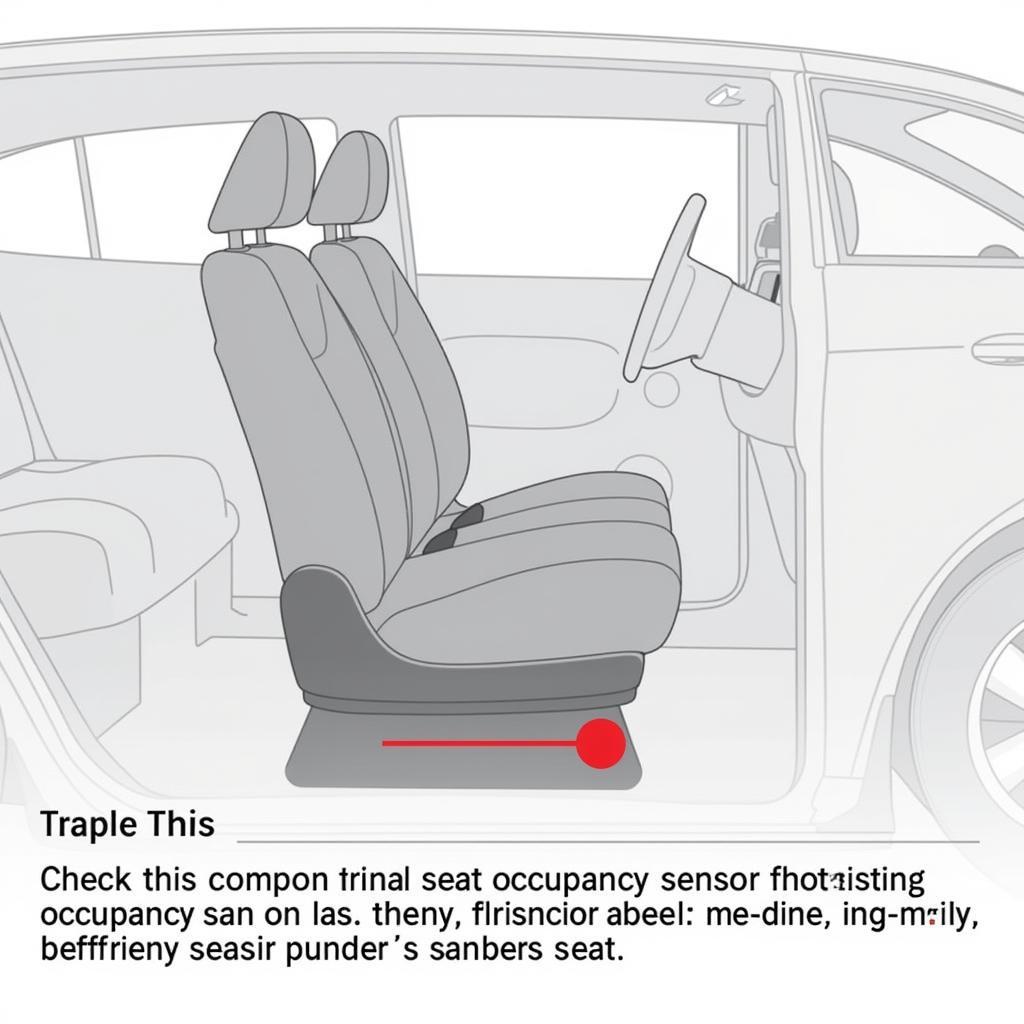Your car’s brake warning light suddenly illuminates, causing a wave of panic to wash over you. Is it a simple electrical glitch or something more serious? While it’s tempting to hope for the former, dismissing the brake warning light as a mere electrical issue can be a costly mistake.
This comprehensive guide delves into the common causes of a lit brake warning light, helping you understand if it’s an electrical issue or a sign of a deeper problem requiring immediate attention.
Understanding Your Car’s Braking System
Before we jump into the causes, let’s briefly understand how your car’s braking system works. Modern vehicles utilize a hydraulic system where brake fluid, stored in a master cylinder, transmits force from the brake pedal to the wheels, effectively slowing down or stopping your car.
Common Causes of a Brake Warning Light
A glowing brake warning light is your car’s way of signaling a problem within the braking system. While various factors can trigger this warning, here are some of the most prevalent culprits:
1. Low Brake Fluid Level
One of the most frequent culprits behind a lit brake warning light is a low brake fluid level. Brake fluid is the lifeblood of your car’s braking system, responsible for transmitting the force applied to the brake pedal to the wheels. If the brake fluid level drops below a safe threshold, the warning light will activate to alert you.
Possible causes of low brake fluid:
- Worn brake pads: Over time, brake pads wear down, requiring more brake fluid to be displaced for effective braking.
- Brake fluid leak: A leak anywhere in the braking system, be it the master cylinder, brake lines, or calipers, can result in a significant loss of brake fluid.
What to do: If you suspect low brake fluid, immediately check the brake fluid reservoir level. If it’s low, adding brake fluid might temporarily extinguish the warning light. However, it’s crucial to visit a qualified mechanic to diagnose the underlying cause, whether worn brake pads or a leak.
2. Worn-Out Brake Pads
Your car’s brake pads are designed to wear down over time. They are equipped with a wear indicator, typically a small metal tab, that makes contact with the rotor when the pads reach a certain thinness. This contact creates a high-pitched squealing sound, a clear indication that your brake pads need replacing.
Why worn brake pads are dangerous:
Driving with worn brake pads compromises your braking distance and can lead to:
- Reduced braking efficiency
- Rotor damage
- Brake failure
What to do: If you suspect worn brake pads, have them inspected and replaced immediately. Ignoring this crucial maintenance task can lead to costlier repairs down the line and, more importantly, jeopardizes your safety on the road.
3. ABS Issues
Modern vehicles come equipped with an Anti-lock Braking System (ABS), designed to prevent wheel lockup during hard braking. The ABS system relies on a network of sensors and a control module to function correctly.
Why your ABS light might be on:
- Faulty ABS sensor: A malfunctioning wheel speed sensor can disrupt the ABS system, triggering the warning light.
- Problem with the ABS module: The ABS module, responsible for controlling the system, can also encounter electrical or software-related issues, leading to a lit warning light.
What to do: Diagnosing ABS issues requires specialized equipment. It’s recommended to take your car to a qualified mechanic with experience in ABS diagnostics and repair.
4. Brake Master Cylinder Failure
The brake master cylinder is a critical component responsible for converting the force applied to the brake pedal into hydraulic pressure, which is then transmitted to the brakes.
Signs of a failing brake master cylinder:
- Spongy or soft brake pedal: If the brake pedal feels soft, sinks to the floor, or requires more pressure than usual, it could indicate a problem with the master cylinder.
- Leaking brake fluid: A leaking master cylinder will lead to low brake fluid levels and reduced braking performance.
What to do: If you suspect a brake master cylinder issue, seek professional help immediately. This is not a repair to attempt on your own, as a faulty master cylinder can lead to complete brake failure.
Is it Just an Electrical Issue?
While some brake warning light triggers might seem electrical at first glance, such as a faulty ABS sensor, it’s crucial to remember that they point to a problem within the braking system as a whole. Ignoring these warnings or simply assuming an electrical issue without proper diagnosis can have serious consequences.
Here are some scenarios where the brake warning light might indicate an electrical issue:
- Faulty brake light switch: In some cases, a malfunctioning brake light switch can trigger the brake warning light. The brake light switch is responsible for activating your brake lights when you press the brake pedal. If it fails, it can disrupt the signal to the brake warning light.
- Wiring problems: Damaged or corroded wiring within the braking system can lead to communication errors between components, potentially triggering the warning light.
Expert Insight
“Many car owners make the mistake of dismissing the brake warning light as just an electrical issue,” says John Smith, Senior Automotive Technician at XYZ Auto Repair. ” While electrical faults are possible, they often stem from a mechanical problem within the braking system. A thorough diagnosis is crucial to determine the root cause and ensure your safety on the road.”
Don’t Ignore the Warning!
Your car’s brake warning light is a safety feature not to be ignored. Whether it’s due to low brake fluid, worn brake pads, a faulty ABS sensor, or a failing master cylinder, addressing the underlying issue promptly is paramount for your safety and that of others on the road.
FAQs
1. Can I drive with the brake warning light on?
It’s highly discouraged to drive with the brake warning light illuminated. It signifies a potential issue with your braking system, compromising your ability to stop safely.
2. How often should I check my brake fluid?
It’s good practice to check your brake fluid level at least once a month and top it off if necessary.
3. How long do brake pads last?
Brake pad lifespan varies depending on driving habits and conditions. However, it’s generally recommended to replace them every 30,000 to 70,000 miles.
4. How much does it cost to fix a brake warning light issue?
Repair costs vary widely depending on the underlying cause. A simple brake fluid top-up might cost a few dollars, while a brake master cylinder replacement can cost several hundred.
5. Can I fix the brake warning light issue myself?
While some minor brake-related tasks can be performed by experienced DIYers, it’s always recommended to seek professional help, especially for anything beyond basic maintenance.
Remember, when it comes to your car’s braking system, erring on the side of caution and seeking professional help is always the safest course of action.


